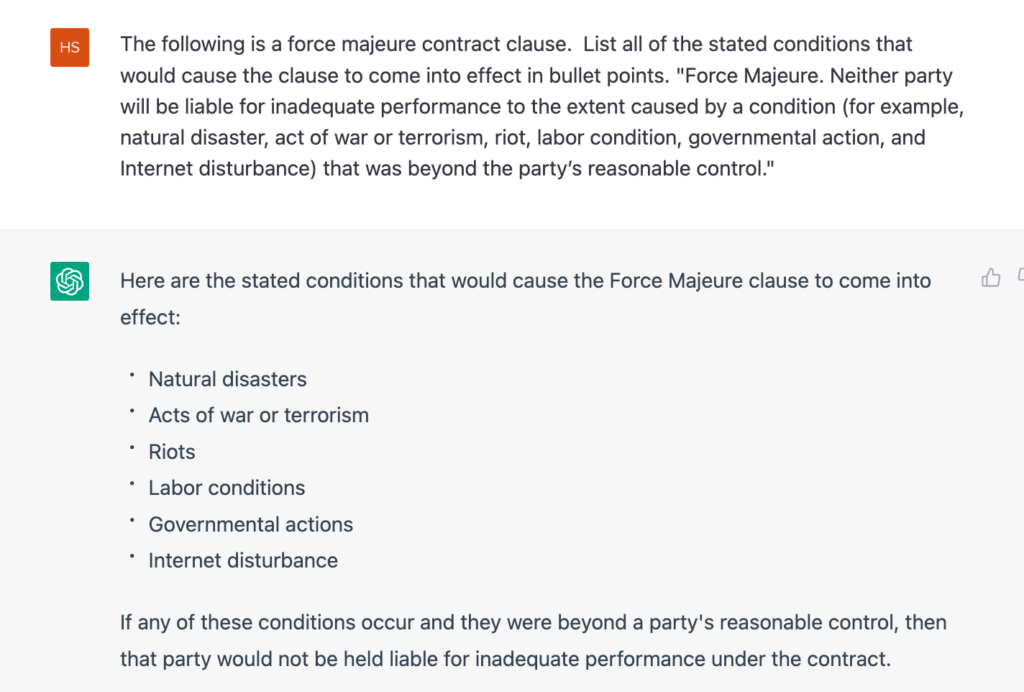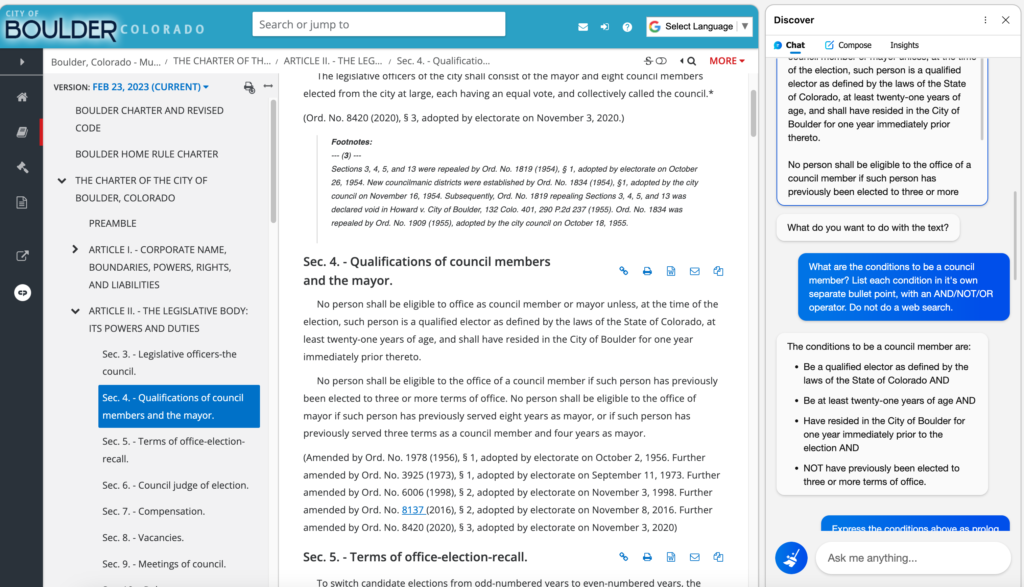This is the first in a series of posts about how we can use new artificial intelligence (AI) in Large Language Models to interact with and understand the law.
No doubt many of us have interacted with ChatGPT or at least of heard it by now. If not, ChatGPT (and similar technologies) represent one of the biggest leaps in Artificial Intelligence (AI) that I have seen in more than 20 years of studying the field. (I am writing a series of separate posts explaining the underlying technology behind ChatGPT, so I won’t go into that here). ChatGPT is an example of Large Language Model (LLM) technology that has been trained with reinforcement learning to respond to human intent, and it is quite remarkable.

In this post, I want to quickly illustrate some of the potential benefits that ChatGPT (and it’s close cousin BingChat) can have on making the law more understandable to the non-lawyers.
Below is an example of a law – it comes from my home town, the City of Boulder Colorado, and it describes the rules surrounding the qualifications to be elected to Boulder City Council.

As you can see, even what should be a seemingly simple set of rules is written in “legalese” and would be difficult for a lay person to actually understand.
“No person shall be eligible to office as council member or mayor unless, at the time of the election, such person is a qualified elector as defined by the laws of the State of Colorado, at least twenty-one years of age, and shall have resided in the City of Boulder for one year immediately prior thereto.”
By contrast, lawyers are trained to parse and understand such obscure legal language, and can, with some difficulty, make sense of it.
However, ChatGPT, and new, similar LLM AI technology are now sometimes able to make law much more understandable to lay people without the need to consult a lawyer. This is perhaps not such great news for lawyers (and law professors like me who train lawyers), but overall is quite good for society, and the many people who are governed by laws they struggle to understand.
I decided to input this section of the Boulder Municipal Code into ChatGPT to see if it could cut through the legal jargon and produce a short and understandable summary.
ChatGPT did a great job and produced what I would consider a very understandable synthesis.

As you can see (above), ChatGPT “read” the law that I gave it, and followed my “prompt”, and produced understandable bullet points that accurately summarize the legal rules in that code. All one has to do currently is “copy” the law and then “paste” it into ChatGPT attaching first a ChatGP prompt similar to mine, such as,
Prompt: “The following is a law. Summarize all of the conditions. Express each condition in a bullet point on it’s own line.”
Now ChatGPT and similar technology are still relatively in their infancy. And it is not too hard to imagine having a AI LLM “companion” on the web translating difficult-to-understand legal text that people encounter as they browse the web, into bullet points that are understandable by the 99% of society who are not lawyers.
We may be not too far from that point right now. As some may have heard, Microsoft has integrated a slightly more advanced version of ChatGPT into it’s Bing Search and Edge Browser (available only to those who sign up for a research preview and get off the waitlist).
Below is an example of Microsoft’s Edge Browser which has Bing Chat (i.e., advanced ChatGPT) directly integrated into the browser. You can give the BingChat Browser extension permission to “peer” into whatever web page you are on, and ask it questions about that page.

Here, I am on the City of Boulder Municipal Web Page, and I am able to ask it to summarize the different parts of the laws in bullet points. It does a terrific job, and produced results similar to ChatGPT.

Of course, this is just early days, and there will certainly be issues with accuracy, etc. But I think this shows a glimpse of a hopeful future in which modern AI can make the law more accessible and understandable to non lawyers, many of whom today are without any access to lawyers, or ability to understand the laws that govern them.